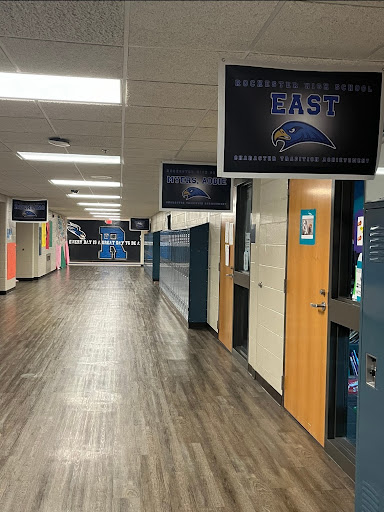
At first glance, a language is nothing but words and phrases. It is simply a way of communication. To many, the only reason to learn a language is to talk, or, in many cases within the younger population, because they have to.
But learning a language isn’t just about talking. It is to communicate. It seems like the same thing – but surprisingly it isn’t. Learning a language brings about the opportunity to share across barriers. Whether it be learning about the culture, the country, or about the dialect of the language itself, learning a foreign language allows you to open up your horizons and explore a different world – one that may not sound like yours.
Yet this idea of learning a new language can seem daunting. Sure there are ways to do it – watch a show or movie in that language, read a book in that language, or my personal favorite, from the Green Owl we all know and love through Duolingo. But one of the most immersive ways to do it at a young age is to take it in school. Can’t find the resources to do so? Well, sadly that seems to be a distinctly American problem.
According to a study by the American Councils for International Education, only about 20% of K-12 take a foreign language, as compared to the countries in Europe who have a much higher rate. According to Eurostat of the European Commission, 24 of the 29 European states have a foreign language learning rate of 80% among K-12 students. Now there’s a big difference.
According to the Modern Language Association’s census, foreign language enrollment in the US has declined 29.3% since 2009. But why has foreign language learning become one of such decline in the U.S? With the need for travel and intercommunication across countries being necessary in today’s world, why wouldn’t you want to learn a new language?
The problem may lie at the roots of all learning – the US school systems. Still, many schools in the US do not offer any kind of foreign language education, and the ones that do offer it are extremely late, at a time when older students have more commitments and responsibilities in mind. But, then again, why shouldn’t one of those responsibilities be to learn a language?
Rochester Community Schools does in fact offer a strong and diverse foreign language program. In 2018, RCS began to allow 7th grade students to begin taking a foreign language, and to start with level one of a foreign language, which many, including myself, took advantage of. This would mean that if a student decided to continue their foreign language education to its maximum, juniors would be able to take the AP equivalent of the language – something only seniors could do in the past. With this new flexibility, students are allowed more options on how to personalize their language skills.
What concerns me, however, is the rising trend of more students opting to simply “finish off” the requirements mandated by districts, and then forget the language learning they did entirely. With only 2 years of a language required, with one of those years having the chance to be waived with an arts or business class, many students are opting out of the language path, and are verging into other classes.
While exploration of diverse classes in high school is important, it is sad to me that so many students are deciding to opt out of the language experience. I myself have enjoyed taking a foreign language. I first took Spanish in 7th grade, and continued with it until I maxed out the language curriculum at RHS, with taking AP Spanish Language and Culture in my junior year.
From these classes, I not only learned a language that I can speak, read, and write in. But I became exposed to a new culture. I gained a look into other countries in the world and other people and their traditions. I feel like I became more aware of another culture, therefore making me a better citizen in this community. If these are the things a language class brings, there should be more students taking it, and there should be more emphasis in the American school system to bring foreign languages to the forefront of its curriculum to expose its benefits to more students.
I was sure I could not be the only one with this opinion, which is why I got the chance to talk to a few other former foreign language learning students about what they think about the current state of language learning in the U.S.
When asked about the benefits learning a language could bring to a student, Zaima Hossain, who took 5 years of Spanish, says “A lot of businesses are going international, so it would be beneficial to be able to communicate with colleagues who don’t speak your first language. Learning a language prepares students for the workplace and the real world, especially since America is so diverse.” 4-year French learner Kareeman ElZayat told me the same thing. ¨Taking a foreign language helps you with multiple tasks outside of school such as reading a menu at a restaurant/cafe and knowing that what you are eating is something else. Not to mention that if you plan to go to another country where English is not the first language, knowing another would help tremendously.¨ I also talked with Gwen Craft, who took two years of virtual Japanese. Although RHS does not offer the language as an in-person course, Gwen took the course online and self studied. She told me “I think it’s definitely important for students to take a foreign language, it’s not only a good skill to have but it’s also good for your cognitive development
In a conversation with Fabeha Saleem, with whom I shared the experience of taking AP Spanish, the topic of how to increase interest in the language department rose, to which she told me “The career paths for language may be smaller compared to the medical, engineering, and law fields, but they are just as important. Lessened language requirements put this thought in the background by portraying a slogan that says, “Please take 2! We won’t ask for more!” and they leave it at that. I think that the requirements should stay how they are right now; however, there should be greater incentives offered to any student that goes beyond them. AP students do get the incentive of receiving college credit, but what about the ones in levels 3 and 4? What is offered to them in return for their continuity? As far as I know, there is no grade or GPA boost (things many highschool students care about). The bottom line is that language requirements in middle school should increase the interest of students so that they continue the language in highschool. Also, foreign language classes bring together people from around the world. This sounds similar to what social media does and people think very highly of it, so why should foreign language classes be thought of differently?¨
And I totally agree with what she thought! Even though neither Fabeha nor I are going into the field of Spanish, the memories and experiences of the class will continue with us into the future. “one of the highlights of those three years is Señor Wooly! Victor and Billy La Bufanda have taught me a lot and they will forever remain safe in my mind :)” For those reading who took Spanish in middle school, you may have some fond memories of those fun learning strategies!
Again, with such a uniquely American problem, I wanted to get a view into the state of foreign language learning in other countries. I talked to senior Hannah Lee, who completed most of her schooling in Korea, where both Korean and English were emphasized simultaneously. When asked about the different schooling system, she told me “I learned English as a second language since I was in daycare. With being exposed to a second language so young, I was able to learn it better and get to a level where I am fluent and was eager to learn it growing up. Rather than the language just being another class to get a credit in and get a good grade in, it became a source of deeper learning that actually felt important to me, instilling a greater sense of dedication to learn.
While I saw students had these strong opinions of the importance of language learning, I wanted to talk to the people in charge of instilling the language curriculum to their students – our very own language teachers.
As a result, I talked to RHS Spanish teacher Ms. East. To begin, I asked her about the benefits students might receive from taking a language class, to which she said, “ In a language class, students have to be vulnerable and make mistakes. Having a sense of humor disarms the worry and fear of making errors or feeling strange saying new words with a new accent” To me, this not only sounded like a benefit for the language class, but a learning experience that can benefit a student across situations.
I also asked Ms. East about her own experiences as a language teacher, and about the ways she made the language learning process immersive. ¨For about 20 years, I took students abroad to experience the language and culture firsthand. We went mainly to Spain, and to Costa Rica twice. This was a great way to immerse students in what they had learned and many returned later to study abroad. In class, I always connect language with culture and history. I create a lot of project opportunities for students to use the language authentically and have fun doing it.¨
I also had the chance to chat with RHS German teacher Ms. Myers, where I asked her similar questions about her experiences in teaching German. When I asked her about the benefits she has seen among students because of taking a foreign language, she told me, “Now that depends on how much time you have, because I have so many examples of this! Just recently I had a student whose family hosted a foreign exchange student from Germany. That was great because we got to have the student come in and talk about his experiences of growing up in a different country.” When asked about the shocking decline in foreign language education enrollment, she said “I’m no mathematician but that number actually seems too low. It seems like it would be much higher, as budget cuts, lack of funding, and teacher shortages have caused many language programs across the country to be cut. Especially as language classes are seen as more of an elective in some curriculums, it takes a backseat. Actually, a lot of colleges… have cut their programs, but it is also true that some colleges… have seen the importance of foreign languages and have developed it more as well, which is good to see.”
Overall, foreign language classes are a way for students to engage. A way for students to learn about not only the language in question, but about the culture, the practices, and overall the values it takes to be a good citizen in our diverse society. My advice to any students on the fence about continuing their foreign language education, or about even taking a class is this: go for it! The culture and experiences you are exposed to will make meaningful memories for a lifetime. And hey, now you can show off your language skills the next time you meet someone who speaks another language!





